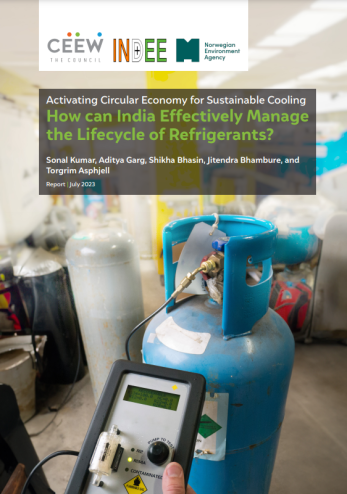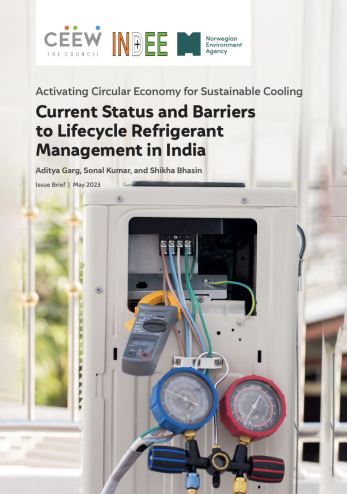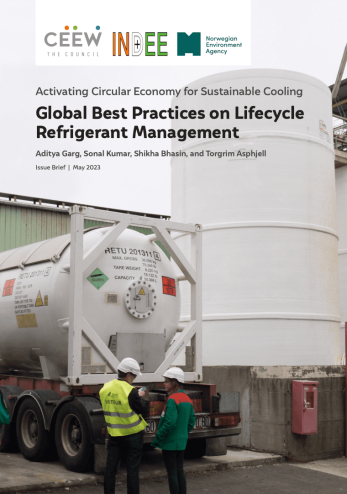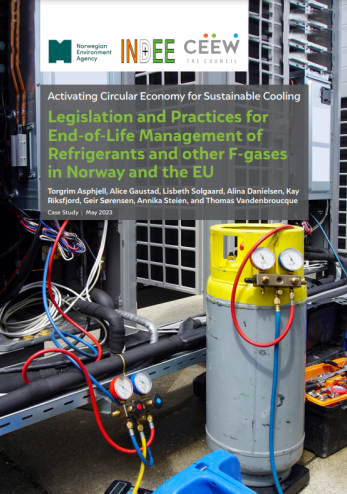



Suggested citation: Bhasin, Shikha, Apurupa Gorthi, and Vaibhav Chaturvedi. 2020. A Universal Certification System for India’s Refrigeration and Air-conditioning Servicing Sector. New Delhi: Council on Energy, Environment and Water.
This issue brief details the framework that can enable India to implement a certification system for the refrigeration and air-conditioning (RAC) servicing sector. The India Cooling Action Plan (ICAP) has identified a skill certification system and the standardisation of training curricula as two immediate steps to be taken for developing the servicing sector. The brief highlights the institutional setup, with public and private actors, needed to effectively manage the certification system. The brief also puts forward the core principles, including equity, improved job opportunities and growth, and easier access to social welfare programmes, that the design and functionality of this system must reflect.

Source: iStock
India is one of the largest economies in the world today. As it develops and grows, its populations’ access to energy, income, and standards of living as a result of that development are also expected to increase. Given the heat stress and climatic conditions to which several million Indians are exposed, the demand for thermal comfort in general, along with a surge in RAC, are poised for significant growth. According to Government of India estimates, RAC demand is set to grow over eleven-fold in the next two decades, from a meagre 8 per cent penetration rate of household use today (Ozone Cell 2019). This anticipated growth is a welcome harbinger for the general wellbeing, health, and productivity of the population as well as for sustaining industrial growth and competitiveness in India.
However, as the effects of climate change and heat stress become increasingly pronounced and the timeline to scale climate actions retracts, it is paramount that this growth be met in as sustainable a fashion as technology and markets can allow. Given that much of India’s existing cooling still relies on older generations of refrigerants that contribute directly to climate change, and energy demand is already pressed by the minimal air conditioners in use in the country today, India must take the lead in championing cooling access for its populations— across a range of sectors that include households, industry, cold chain, transport, commercial buildings and others—all with the aim of promulgating less global warming.
Two key factors can impede this cooling-induced warming in a business-as-usual format.3 One relates directly to the energy usage and efficiency of the equipment; the other requires a shift to low-global warming potential (GWP) refrigerants that are also ozone-friendly. India has already made considerable strides in affecting consumer preferences for higher efficiency equipment and has an energy efficiency labelling programme that is both successful and ambitious.4 Moreover, it has successfully negotiated and committed to a global timeline to transition to these refrigerants.
However, a common and critical factor that needs to be readied to truly bring out energy savings and refrigerant transitions’ success lies in the installation, operation, and maintenance of these systems. Commonly addressed under the purview of the ‘servicing sector’, these practices are crucial for realising efficiency gains and successfully incorporating refrigerant management and transition targets for India.
The ICAP, a seminal policy document which provides an ‘integrated vision towards cooling across sectors’ while simultaneously lowering cooling demand, facilitating refrigerant transition, enhancing energy efficiency, and promoting technologies over the next twenty years, reiterates the significance and criticality of the servicing sector. With an entire section of the ICAP dedicated to this end, several intertwined and simultaneous goals have been set forth. These relate to formalisation, enhanced safety and wellbeing, training and skill ability, and improved livelihoods for the technicians as well as environmental, economic, safety, and competitive gains for the country as a whole. A major goal underlying these enlisted gains is to enable a universal certification system for servicing technicians so as to regulate this workforce as one that is formally recognised and carries an assurance of a minimum level of qualification and training.
According to OzonAction, the Secretariat of the Montreal Protocol, “certification is the means by which a person (or enterprise), as a result of training, education, external review, and assessment, receives official approval of being able to competently complete a job or task. Certification can be a legal requirement or a measure undertaken voluntarily for professional advantage. Certification schemes which are mandatory by legislation have the advantage of providing a strong incentive for technicians and enterprises to comply” (OzonAction 2015).
Based on extensive desk research and in-depth stakeholder consultations across government agencies and industry as well as servicing sector associations, non-governmental implementing agencies and training partners, as well as nodal agencies operating relevant training and certification programmes in India’s servicing sector currently, this issue brief outlines the benefits, criteria, and a way forward to establishing and executing a universal certification system in India for servicing technicians as a goal enshrined in India’s Cooling Action Plan.5
The following section makes a case for establishing a certification system that recognises the skills and qualifications of servicing technicians such that their safety and wellbeing is ensured, environmental preservation is made a priority, and the increase in jobs and associated qualifications expected this sector can be regulated. Section 3 offers lessons and examples of model certification systems that exist globally in the servicing sector, as well as domestic best-case practices that have been implemented in India so far. Finally, drawing on these lessons and the current status of the sector at large in India, Section 4 highlights principles and the blueprint for designing a certification system in India.
Until the ICAP was launched, experiences in enabling the start of a certification system for India were largely undertaken as part of the HPMP programmes. These focussed on training and reskilling technicians to provide servicing with new classes of refrigerants. The ESSCI’s ongoing RPL programme is a welcome start to testing a system that will have to be scaled and differentiated significantly, given the sector’s current informal nature as well as the anticipated growth in various cooling-related sectors. As a first, the ICAP is focussed on establishing a ‘voluntary certification scheme through a single government entity under a single framework’, and the ESSCI is managing this task, aiming to reach 100,000 RAC technicians by 2021. However, this number is set to increase at least eleven-fold over the next two decades. The next two decades will also see an influx of new refrigerants and associated technologies. Thus, a systematic formalisation and validation of technicians and their knowledge is paramount. This is no mean task for the government to manage alone. The private sector will have to rise to the occasion and not only partake in this transition from the perspective of product diversification but also be more responsive in readying the servicing sector to this end. This brief highlights the institutional setup (with public and private actors) required to effectively manage a certification system, where the latter is independent of the training centres in the long term, and puts forward core principles that the design and functionality of this certification system must reflect, including but not limited to, equity, preservation of environment and safety, improved job opportunities and growth, and easier access to social welfare programmes. It is only when these qualifiers are met that the success of a certification system will be realised.
1Definition for the formal and informal sector is based on Sridhar and Chaturvedi (2017). They considered formal sector as service centres authorised by manufacturers (provide services under warranty or have access to official spare parts) and multi-brand centres which are registered enterprises (not authorised by manufacturers). They further clarify that self-employed individuals and own-account or unregistered enterprises constitute the informal sector.
2In a previous CEEW publication, residential air-conditioning was abbreviated to RAC. However, as per the ICAP, RAC refers to refrigeration and air-conditioning sector. The ICAP definition of RAC has been used in this brief.
3Business-as-usual does not account for other not-in-kind cooling technologies that may emerge on the market.
4For more details, please refer to CEEW 2020, Energy efficiency/household RCT report
5Annexure 1 lists all the stakeholder consulted for developing this brief.
6CEEW, as part of this project, has also researched and published a study on enhancing the training curricula for servicing sector technicians. This can be accessed at https://www.ceew.in/publications/safety-upskilling-and-good-servicing-practices-cooling

Activating Circular Economy for Sustainable Cooling

Activating Circular Economy for Sustainable Cooling

Activating Circular Economy for Sustainable Cooling

Activating Circular Economy for Sustainable Cooling